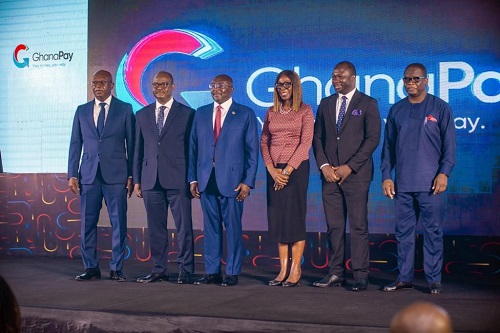GhIPSS organizes gh-link Val’s day promo at specific shopping outlets

Shoppers using gh-link cards during the Valentine period, from February 14 to 17, 2024, will enjoy special rewards at the two China Malls located on the Spintex Road and Zen Petroleum at Odorkor. The four-day promotion is a collaborative effort between GhIPSS, Stanbic Bank, China Mall, and Zen Petroleum, aimed at creating awareness on the use of the gh-link card as a payment card and not just as an ATM card used for cash withdrawals.
The gh-link card, a domestic scheme card issued by various banks, is easily recognizable with the "gh-link" logo embossed on it. These cards can be utilised at all gh-link ATMs and Point of Sale (PoS) devices nationwide. ATM Transactions with gh-link cards typically incur lower charges, whilst POS transactions with gh-link cards are free to the cardholder. Dispute resolutions associated with gh-link transactions are resolved faster in case of disputes.
Mrs. Akosua Blay Head of Cards & Verified Payments at GhIPSS, in an interview emphasised that while the promotion aligns with efforts to reduce cash dependency and promote electronic payments, it also aims to spread love during the Valentine season. She encouraged the public to utilise their gh-link cards at the designated outlets to qualify for reward packages and advised those without gh-link cards to obtain them from their banks in order participate in the promotion. “If you do not have a gh-link card, visit your bank and request for a gh-link card, so you do not lose out on this promotion”.
Additionally, Mrs. Blay urged banks to educate customers about the distinctions between domestic and international scheme cards to help them make informed choices. She hinted at more reward schemes for gh-link cards in the future and urged the public to embrace domestic scheme cards.
The Head of Cards noted that a large number of shopping outlets now have their POSes accepting the gh-link cards and urged the public to patronise these POSes instead of paying with cash. The superiority of cards over cash such as security, provision of audit trail and the direct deposit of the funds into the bank account of the merchant were emphasized.

 The Ghana Interbank Payment and Settlement Systems (GhIPSS) has collaborated with the Ghana Association of Banks (GAB) for the development and launch of a bank-wide mobile wallet christened GhanaPay. The move is an attempt by the GAB to extend financial inclusion to low KYC customers using existing familiar channel like the mobile wallet solution.
The Ghana Interbank Payment and Settlement Systems (GhIPSS) has collaborated with the Ghana Association of Banks (GAB) for the development and launch of a bank-wide mobile wallet christened GhanaPay. The move is an attempt by the GAB to extend financial inclusion to low KYC customers using existing familiar channel like the mobile wallet solution.